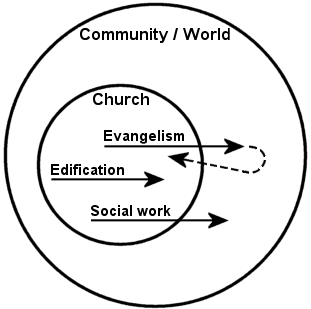

PRINCIPLE 26 |
Throughout the New Testament the word "church" (Greek: ekklesia) is used to refer to people. We would do well to remember that, but we easily forget. One of the reasons we forget that the church is people is that our English word "church" is typically used today to refer to organizations and programs of either one local church or a whole denomination. And when we say that we are going to stop and talk with the pastor at the church, we are referring to the church as a building. Of course, such usages are common and completely legitimate today. However, in the New Testament the word "church" (ekklesia) was never used to refer to a building, organization, or program. In the New Testament "church" always refers to people.
The Greek word ekklesia (which literally means "called out ones") is nearly identical to our word "group" in its meaning and usage. The context of each use of this word in the New Testament usually distinguishes this group from other groups by indicating their positive relationship to Jesus or to God. Thus, perhaps the simplest and shortest definition of the local church is that it is a group of saved people.
To expand our short definition of the local church we could say that it is a group of professing Christians in a given locality regularly involved in Christian interaction. Ideally, the local church is merely a space-time segment of the universal church. In other words, since the universal church is composed of all true Christians in all places throughout the entire age of the church, each local church should be a subgroup of the universal church interacting in just one place during one period of time. Realistically, however, a local church may not involve every Christian in its locality, and it may involve some who are not really Christians. Nevertheless, we will consider the local church to be composed primarily of true Christians. The significance of the "Christian interaction" mentioned in the definition will be explained in the next sections.
Is the church (the "called out ones") only a church when the people are called out to a meeting? No. The fact that ekklesia stands for "called out ones" signifies only that they are called out of the world and called into the family of God, or into Christ. In fact, the New Testament refers to various groups of saved people as "church" even when the people were scattered (Acts 8:3; 14:27; 1 Corinthians 14:23).
What is the mission, or purpose, of the church? Since the church remains the church both while its people are gathered and while they are scattered, our question about the mission of the church can be asked in two ways. First, what is the purpose of the church when it is scattered? And second, what is the purpose of the church when it is gathered? In other words, what should Christians be doing when they are spread out in the community as individuals? And why should Christian meet with each other?
Since all ministry is aimed at fulfilling needs, these two questions can be answered very easily by noting the needs of the people involved. Nonbelievers need to become Christians. So when the church is scattered among nonbelievers, its mission is to evangelize them. In contrast, Christians do not need to be evangelized, but they do need to grow toward Christlikeness. So when the church is gathered and Christians are interacting with other Christians, its mission is to edify each of the believers and encourage their spiritual growth. In short, the church's reason for existence is twofold: evangelism when the church is scattered, edification when the church is gathered. Evangelism has been discussed in chapters 8 through 16. The key elements which make up edification are discussed in the next chapter.
Which is more important, evangelism, edification, or social work? Each one is required by the New Testament.
| Support for evangelism |
Support for edification |
Support for social work |
|---|---|---|
| Jesus' example Matthew 28:19 Ephesians 4:11 Acts 13:2-3 |
Jesus' example Matthew 28:20 Ephesians 4:11 Acts 15:36 |
Jesus' example James 1:27 1 Timothy 5:3-16 Luke 9:2 Galatians 6:10 |
As pictured in the following diagram, evangelism involves a Christian (someone who is already part of the church) reaching out to a non-Christian for the express purpose of explaining the gospel and inviting him to become a Christian (come into the church). Edification involves a Christian ministering to another Christian (who is already part of the church). And social work involves a Christian reaching out to help a non-Christian cope with life and live with dignity even though he remains outside the church. (Of course, social work can also take place within the church, as mentioned in Galatians 6:10.)

Each of these three elements affects, and is affected by, the other two. A person cannot be edified before he is evangelized. Yet, a person who has been edified (and thus has grown spiritually) will be more effective in evangelism. Also, engaging in evangelism edifies a person (helps him grow spiritually). Social work, although it is not done for ulterior reasons, still opens many opportunities for both evangelism and edification. Thus, in various ways, these three activities are interdependent.
The local church cannot pick out one of these three activities and say that it will limit its ministry to that one. The church must engage in all three. Of course, the church will also have to decide which one or ones must be emphasized, depending on the needs in the church and in the community. But the church must never neglect any one if these three activities. Balance is the rule.
However, as far as the individual Christian is concerned, balance is not as important. Individuals are gifted in some areas much more than in other areas, so some individuals, for instance, may do much edification and little social work, or much evangelism and little edification. The individual should devote most of his ministry to the specific areas where he feels he is most effective. Gearing his ministry according to his own gifts and abilities is more important than trying to achieve a perfect balance. However, when dozens or hundreds of Christians are found together in one local church, the three activities of the whole church will be much more balanced.
The Bible teaches that God has established three agencies: the family, civil government, and the church. Besides these three, Christians have established numerous other agencies. What is the place of the church among all these agencies. First we will look at the church and the family.
In Old Testament times God's two nurturing agencies were the family and the system of worship and culture God gave to the nation of Israel. In New Testament times God's two nurturing agencies are the family and the local church. These two agencies are quite similar in their purpose and their potential, thus they should be viewed as complementary rather than competitive. Nevertheless, each one has something to offer. The home is especially suited to the evangelism and nurture of children, and bears most of the responsibility for that. The church is especially suited to the evangelism and nurturing of adults, and bears most of the responsibility for that. The total responsibility is shared between the home (parents) and the church, but there is a gradual shift in that responsibility (throughout the life of an individual being ministered to), as pictured in the diagram below.

The home and the church are mutually interdependent. The church can help the home greatly by electing officers and leaders who are pleasing God in their family lives and who are sensitive to the needs of families. The church can also allow the family to have more time together. And through its various programs the church can give adults the instruction and practical help they need to be effective partners and parents. The healthier the families, the healthier the church. And vice versa.
The church includes many agencies, some within the traditional program of the local church and some outside.
Agencies Often Found as Subgroupings of the Local Church |
"Para-church" Agencies (Branches of the church) |
|---|---|
|
|
The various agencies listed in the right column have been called "parachurch" agencies, but that label is most unfortunate. Instead, they should be referred to as "arms" or "branches" of the church. "Para" means beyond or alongside. If these agencies were truly alongside the church, then they are not part of the church. But these agencies really are part of the church just as a branch is part of a tree. They may not be part of any one local church, but they are certainly part of the universal church. They are believers who are regrouped and organized in highly specialized ways to carry out part of the church's great commission. Just as local churches are geographical groupings of the universal church, these agencies are also groupings of the universal church. Their makeup and purpose may be outside the traditional program of the local church. Their specific mission is more specialized and they usually draw their personnel from various local churches. But these facts should not make us think of them as outside the church.
Just as the family and the local church are interdependent, so are the local church and these many branch agencies. The trunk needs its branches and the branches need their trunk. Neither can take the place of the other. They must learn to cooperate and not compete. There is a constant need for communication and mutual support between the various groupings of the church – the family, the local church with its many local agencies, and the many branches of the church.